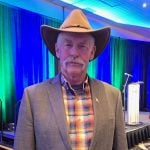BOX SPRINGS COULEE, Alta. – Horses, mules, cattle and riders, wagons and carriages filled the horizon and spread across the prairie. For six days the procession crossed near-virgin prairie and rode into the journals of western Canadian history.
In celebration of the 100th anniversary of the first Western Stock Growers Association meeting, more than 2,000 head of cattle, 1,500 people, 1,700 horses and mules and 103 wagons made a 90-kilometre crossing of Canadian Forces Base Suffield.
In the pre-dawn glow of July 21 the Great Centennial Cattle Drive began to form up. Horses that had spent one or two days in the corrals were harnessed and saddled for the first day of travel.
Read Also

Chinese, Indian tariffs take toll on pea prices
The disruption of pea exports from Canada’s largest customers will likely result in slow pea exports for the remainder of the crop year.
New to the experience and nervous from the sheer number of people and stock, the animals created a morning of excitement. Teams of horses broke free from owners and crashed through other parts of camp. A riderless horse or two raced down the rope fence, saddles hanging upside down. A couple sat helplessly as the front wheels, torn from a now steeply sloping surrey, raced away in cloud of dust behind their team.
After two days of impromptu morning rodeos, participants and their horses got used to the daily routine of 4:30 a.m. starts and 15 to 20 kilometre treks across fenceless rolling prairie. The hollered phrase “loose horse, heads up” became more of a joke inside the communal shower.
The creature comforts
Life in camp was simple, but quite unlike that of cowboys at the end of the last century who drove herds from as far away as Texas. The hot showers, catered meals and beer wagon would likely have been really appreciated back then.
Every day the entire camp was struck and moved to a new site. Fifth-wheel trailers carried the tents and luggage that horse-drawn wagons could not hold. Cook tents and port-a-potties leap-frogged from one day’s camp to the next.
The cattle moved with a second camp of wagons. Wranglers and drovers worked through the days and nights, moving the large herd across unfamiliar terrain without benefit of fencelines.
Escape in the night
Some restless Longhorns escaped northward on one dark and moonless night, heading into the active weapons ranges of the military reserve.
The cattle camp’s horses found it easy to escape as well. Cowboys cantered through the darkness to find the wayward critters, and found themselves suddenly among a group of prone, camouflaged British soldiers who panicked at the prospect of being trampled in the darkness. Leaping to their feet, they equally surprised the wranglers.
During the day, hot sun baked on the dust, sweat and rain. Weather and inexperience took its toll on riders and stock. A few broken bones, saddle sores and a case of heart trouble kept the medical team busy.
Ten volunteer veterinarians looked after maladies of the stock. One horse with a broken foot had to be put down, but otherwise the vet expertise was limited to minor abrasions, and a few cases of lameness and foot rot.
As the camp moved to within a few kilometres of its Medicine Hat goal, tragedy struck when a young rancher and his horse were drowned while making a night crossing of the South Saskatchewan River.
Finally, triumphantly, the procession moved into the streets of Medicine Hat, six days after leaving Buffalo, Alta. A bunch of cattle sent a few spectators hustling for safety, but thousands of other people watched as the herd passed swiftly through town.
“There are no proper adjectives to describe the feelings I have for this trip. It must be simple, for these are simple pleasures we have shared with this earth… It was good, my friend. It was very good,” said Robby Fyn, of Linden, Alta.
At the end of the trail, more than a few of the participants said they would saddle up and drive the herd back to Buffalo that very night, if given the chance.














